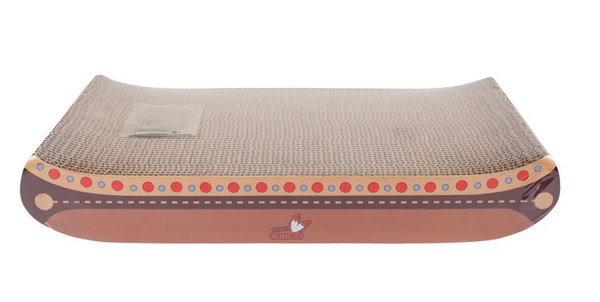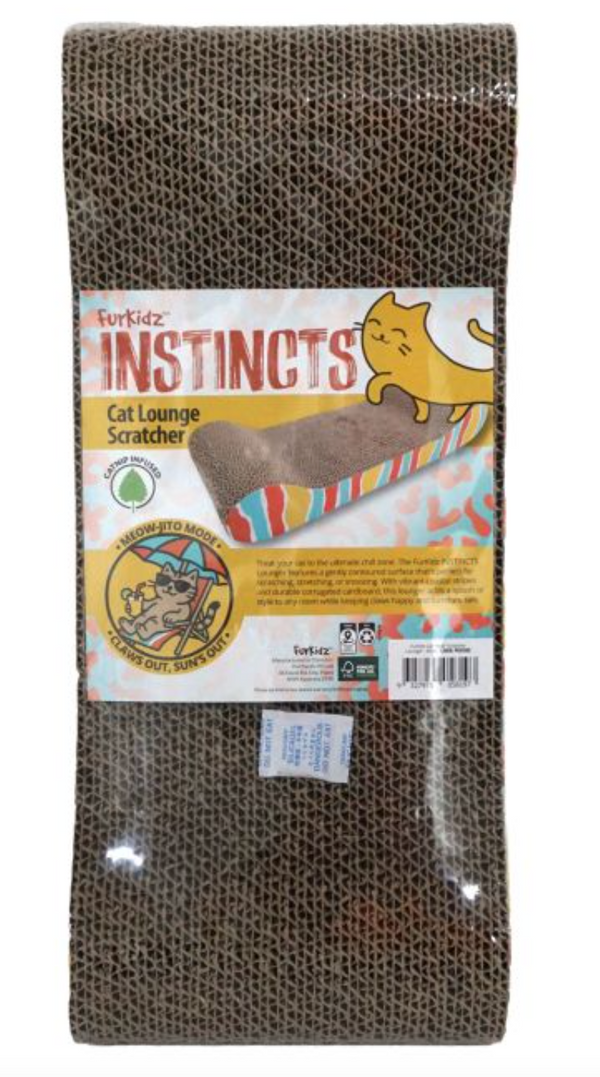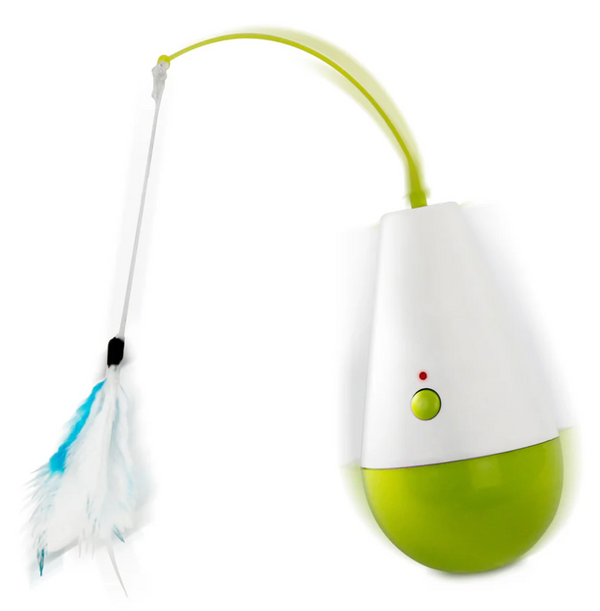“What greater gift than the love of a cat” – Charles Dickens
When your cat curls up next to you and starts to purr, it's one of the most calming sounds in the world. But beneath that calming vibration is an interesting story about biology, emotions, and even the ability to heal. There are many reasons why cats purr, and being happy is only one of them. Recent research has shown that cats can purr between 25 and 150 Hz. This range has been shown to help both animals and humans heal bones and grow new tissue.
So, what makes cats purr? What does it mean when your cat purrs, and how do they make that sound? Let's learn about the science behind cat purring, discover the hidden reasons why cats purr, and see how this sound, which seems normal, is connected to their health, happiness, and communication with us.
What Does It Mean When a Cat Purrs?
People think that cats purr when they're happy, and that's true, but only in part. The purr of a cat is one of the most complicated and useful ways for a cat to make sounds. It can be used to talk to someone and show happiness, comfort, or even distress.

When your cat jumps on your lap, kneads gently, and starts that low hum, they're usually showing that they feel safe and relaxed. This kind of domestic cat vocalisation dates back to kittenhood, tiny kittens start to purr when they’re nursing. It helps mothers locate their young and builds early bonding.
However, cats also purr when they’re stressed, injured, or unwell. This isn't just a strange thing; it's a biological process. The purr frequency helps the body make endorphins, which can help with pain and calm the nervous system. It's their way of calming down, like how people hum or take deep breaths when they're nervous.
The Science Behind Cats' Purr
It's interesting to learn how cats make a purring sound. Purring doesn't come from the vocal cords like other sounds. It comes from a neural oscillator in the cat's brain that keeps sending signals to the laryngeal muscles.
These muscles twitch 25 to 150 times a second, which makes the glottis (the space between the vocal cords) open and close quickly. When the cat breathes in and out, the air touches the vibrating muscles, which makes the soothing sound.
And here's the best part: cats can purr while they breathe in and out. That's what makes their hum so steady, rhythmic, and hypnotic.
7 Scientifically Backed Reasons Cats Purring
Based on research and studies of cat behaviour, let's look at the main reasons why cats purr.
1. Happiness and Comfort
Cats purr when they are happy and safe. When your cat is relaxing in their favourite spot or getting soft strokes, you can hear this purr. It's a way for cats to show that they are happy and connected.

2. Communication and Bonding
When kittens are cold or nursing, they purr to let their mother know they are there. This continues as a way for adult cats to talk to people. The soft vibration you feel when your cat lies on your chest isn't random; it's their way of saying, "I trust you."
3. Healing and Recovery
The most interesting thing about how cat purr healing works is that it helps people get better. The Journal of the Acoustical Society of America says that the sound of a cat's purr can help bones and muscles heal. That's why cats often purr when they're hurt; it helps them relax and heal faster.
4. Stress Relief and Self-Soothing
When cats are stressed, anxious, or in a new place, they purr. This kind of purring is like deep breathing for people; it helps keep cortisol and heart rate levels in check. You might hear this when you take your cat to the vet. The sound isn't always happy; it's a way for them to deal with stress. Engaging your cat in gentle play with a cat wand toy at home can help ease that tension, providing a healthy outlet for their energy and encouraging a calmer, more content state.
5. Expressing Needs
Cats have figured out how to use their purrs to get what they want. Researchers found that some cats' purrs have a high-frequency "cry" in them that sounds like a baby's cry. It's called the "solicitation purr," and it's how cats get your attention, especially when they're hungry.
6. Social Bonding
Cats purr when they are grooming or lying next to other cats. It makes their friends trust and love each other more. If you have more than one cat, purring is a peaceful way to let them know that everything is okay and that they should get along.

7. Comfort for Humans
More and more studies show that the sound of a cat purring, especially in the 50–100 Hz range, can calm people down and lower their stress and blood pressure. It’s no wonder “purr therapy” is becoming popular in wellness spaces. When your cat purrs on your lap, they’re not just relaxing, you are too.
Do All Cats Purr?
Not all cats can purr, which is interesting. Lions and tigers, on the other hand, roar instead because their hyoid bones are shaped differently. Only domestic cats, cheetahs, and a few smaller wild animals can purr for long periods of time.
If your cat purrs while curled up on your couch, you are seeing something that even a lion can't do!
Is Cat Purring Always Good?
Most of the time, purring means that your cat is happy, but it can also mean that they are in pain or uncomfortable. If your cat is hiding, refusing food, or acting tired all the time, and it purrs a lot, it could be sick. When cats are hurt or sick, they purr to calm themselves down. But this can also mean that they have other problems, like arthritis or dental pain.
It's always a good idea to take your cat to the vet if you notice strange purring patterns. After all, how often you take your cat to the vet can make all the difference in early detection.

The Healing Power of a Cat’s Purr
Here’s where science gets truly remarkable. Research indicates that vibrations within the range of 25–50 Hz promote bone growth, whereas those at 100 Hz facilitate soft tissue healing. Cats purr exactly within this frequency range!
Veterinary researchers believe that’s why cats recover faster from injuries than dogs of similar size. Their self-soothing behaviour may literally double as a built-in healing therapy.
So, when your cat curls up next to you and hums softly, remember that it's not just a sign of love; it's an evolutionary superpower.
Encourage Healthy, Happy Purring
When cats feel safe, stimulated, and well cared for, they purr the most. Here are some useful, doable ways to make that space:
1. Provide Comfort and Routine
Cats do best when things are stable. Keep your cat's feeding times the same and make sure they have warm places to sleep. They might like to purr on a soft bed or a window perch.
2. Engage in Play
Regular playtime keeps your cat mentally and physically healthy. Interactive toys that mimic hunting behaviour and let cats release pent-up energy, like a cat wand, make them purr more relaxed and happy afterwards.
3. Offer Safe Spaces
Cats need quiet zones where they can retreat when overwhelmed. This calms the purring and makes you feel better.
4. Mind Their Health
Give them a balanced diet and keep an eye out for signs of stress or illness. Your cat's purring when you pet it is often a sign that it feels safe. To keep your cat healthy, take it to the vet regularly and feed it the right food.
5. Add Enrichment
Keep your cat busy even when you're not home. You can find puzzle feeders, tunnels, or climbing trees online that will get your cat's natural instincts going.
The Emotional Connection: Why We Love the Purr
Listening to a cat purr can help you feel better after a bad day. Researchers have found that listening to a cat purr can lower stress hormones in people and even make their hearts healthier.

Your cat purrs to feel better, and you feel better, too. It's a biological feedback loop of comfort. This peaceful symphony between species is one of the best examples of empathy between species.
Final Thoughts
When your cat curls up and hums softly, take a moment to enjoy what's going on. That sound is more than just noise; it's a conversation about trust, healing, and emotional intelligence.
Cats remind us that happiness doesn't need words; it can vibrate quietly through the air. When they purr, they do this to relax, heal, or just to let you know they love you.
You can also make your cat's life better by getting them comfy beds, grooming tools, and fun cat toys online from reliable cat pet stores such as Cat Shop Online. When our cats purr, we know everything we need to know about them.




